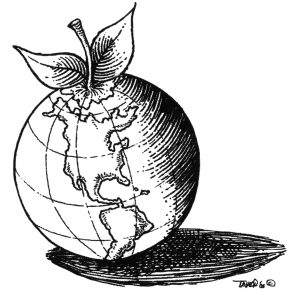
We need to grow inward and find value in what we have been ignoring.
By Tom Crofton
The Commoner Call (1/21/19)
Combating climate change will definitely mean changing some of our regular activities. We need to start making different choices. Our society has been based on carving up a new frontier, draining the resources and moving on to virgin territory. That era of outward growth is over. We need to grow inward and find value in what we have been ignoring. A new sustainable society needs to be fashioned from where we are and what we have been wasting.
Contrary to right-wing-speak, shifting to renewable, sustainable economics is not going to require us returning to the stone age. There are choices all around us that offer reduced carbon footprints and less garbage produced from our activities. We can not wait on technological fixes before we act, though certainly smart use of technology is part of the answer. We must look at the materialism we have been accustomed to and decide how much of the disposable society we have been living in, we really need to hang on to.
While we build the alternative electrical production and storage that will power our future electric vehicles, we can start the transition away from imported fossil fuels now with conventional technology. The infrastructure is already in place.
Future articles in this series will address what sustainable economics mean, and how they differ from our present model. Since fossil fuel use is the leading cause of increasing greenhouse gases in our atmosphere, we need to explore an immediate course of action to make a dent in fossil fuel use.
Generating wealth at home
Wisconsin has no oil or natural gas production and a great deal of our electric power is imported, or made from imported fossil fuels. Besides the negative environmental impacts of using these fuels, we suffer from their economic costs. The fuel and power brought into the state sends almost 20% of our GDP away. That money is gone for good. Every alternative power plan that uses local resources keeps that money here, to be multiplied 5-10 times in local economic activity.
While we build the alternative electrical production and storage that will power our future electric vehicles, we can start the transition away from imported fossil fuels now with conventional technology.
The infrastructure is already in place for us to purchase locally produced bio-fuels for our existing gasoline and diesel vehicles. Several ethanol and bio diesel plants are operating in Wisconsin. Cars that can use E 85 are available. Trucks and farm equipment can run on plant-based bio-diesel with few modifications.
Local government units can contract with local farmers to purchase oil crops and squeeze their own diesel fuel for their highway departments. Since the byproduct of oil seed pressing is excellent animal feed, partnerships with local co-ops could create feed and fuel without the transportation expense of imported oil.
Gasoline powered sheriff vehicles that use E 85 are available. Local gas stations are now offering this product.
Constructive role for local government
An intentional effort by local government units to use these locally produced bio-fuels will help the public become aware of the benefits and help educate people to make similar changes themselves.
The auto and truck industry is changing quickly so these ideas are for immediate use only. No large investment into these technologies is needed. The plants and vehicles exist and are waiting for our purchase. Many new cars already can burn ethanol blends. Diesel vehicles require new filters, and cold weather operation with vegetable oil requires blends or heated tanks. But all those details have been worked out. Much has been written about the problems with turning our farms over to producing fuels and the inefficiencies of ethanol production. The reality is that gasoline production is even less efficient than ethanol and that we need to transition away from them both. Best practices do exist to greatly reduce agricultural pollution and environmental impact, so at a local effort bio-fuels offer a way to farm sustainably.
We need to intentionally act to reduce fossil fuel use every way we can now, and then set our sights higher for future action. Efforts such as “farm to table”, “grass-fed”, and “buy local” are parallel efforts to building the new economy. The synergy between food and fuel is clear: all food production has fuel as a by-product, all bio-fuel production has feed as a byproduct. Sustainable economics seeks to use the by-product streams of production to close the loops and stop the environmental destruction of waste streams. We can do this.
A new path for farmers
While climate change effects us all, most calls for action come from progressives. A stumbling block for progressives is to find ways to bring conservatives along with the changes needed to make a difference. Bio-fuels are a meeting place between conventional agriculture and sustainable economics. Bringing politically conservative farmers into progressive action based on the economic benefits to them demonstrates a synergy that simple advocacy can not create.
Basic Economics 101 dogma that the best and most efficient ideas win has long been mangled by actual practice of industry groups and less than free markets. The propaganda of capitalism denies its stranglehold on obsolete methods and technology and supports centralized control. Bio-fuels and local processing offers farmers a way to use 10% of their cropland to make their own fuel and feed sustainably, and independently of globalism. That is a victory in itself.
(Commoner Call illustration by Mark L. Taylor, 2016. Open source and free to use with link to www.thecommonercall.org )
*****
A Mountaineer Writes A Firsthand Report From The World’s Melting Glaciers
By Lulu Garcia Navarro
NPR (1/21/19)
NPR’s Lulu Garcia Navarro speaks with journalist Dahr Jamail about his new book, “The End of Ice,” on climate change and its consequences to nature and humans.

